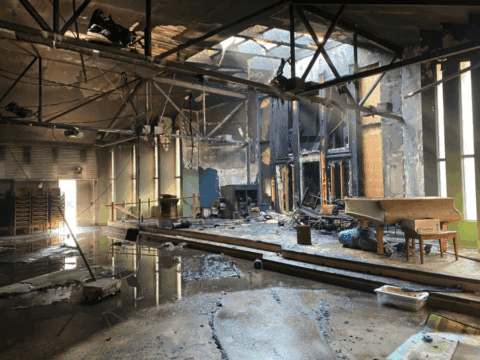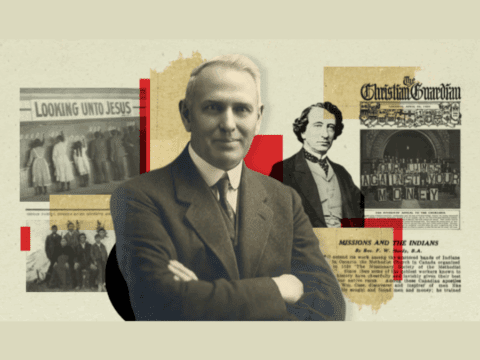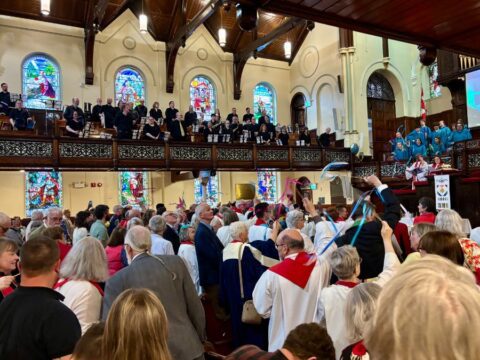The United Church of Canada’s General Council staff are discerning how to move forward after a commissioner anonymously uttered obscenities at a General Council 44 event on April 6. The offensive remarks came toward the end of the virtual learning session, as Jewish interfaith guest Richard Marceau, vice-president, external affairs and general counsel of The Centre for Israel and Jewish Affairs, was seeking clarification on a proposal.
Two commissioners who attended the event recalled the speaker’s words with slight variations, but the phrase uttered was very close to, “Why the f— does he get to talk?”
In an email to Broadview, Marceau describes the incident as “profoundly shocking and hurtful,” saying that it was “one I did not expect as an official guest of the church.” Marceau, as well as Rabbi Allan Finkel, of Temple Shalom in Winnipeg, who also attended as a Jewish interfaith guest, has suggested that the United Church needs to wrestle with lingering anti-Semitism in the denomination in light of the remarks.
General Council staff and commissioners reacted with collective shock in the initial aftermath of the incident.
Rev. Ohwang Kwon, a commissioner and minister at Consort Knox United in Consort, Alta., describes feeling a sense of disbelief, followed by outrage. “After those words were spoken, everybody was surprised, perplexed and angry,” he says.
“It was extremely difficult for Alan Buckingham [GC44 business coordinator] and the other leaders, like the general secretary and the moderator, to continue,” he adds.
Both Rev. Michael Blair and the Rt. Rev. Richard Bott, the general secretary and moderator respectively, immediately offered an apology to the Jewish interfaith guests on behalf of The United Church of Canada, as did Rev. Jennifer Janzen-Ball, executive minister of theological leadership. Commissioners also expressed their personal apologies using the online platform’s chat function.
An apology on behalf of the United Church was posted to the General Council 44 website on April 7. It invoked the words of the moderator the day before: “What has just happened is unacceptable for our community. I know there are feelings that run strongly, but we have agreed to treat each other respectfully.”
The offensive comments were spoken in a learning session — in which points of clarification are sought, but no debate or discussion entered into — focused on a series of proposals related to the Israel-Palestine conflict. One such proposal emerges from the report of the Just Peace Task Group, an advisory committee on how to respond to the calls of the church’s partners in the region, and recommends adopting a principles-based approach to issues related to the conflict.
“We need to think about how to create a culture where we can have this conversation in peace,” says Kwon.
“I feel like a lot was destroyed with that one comment. It’s such a hard trust to build,” says Rev. Wanda Stride, another commissioner and a minister at St. Andrew’s United in Brighton, Ont. “It really felt like something was shattered.”
“To say that this is an equity issue is a huge understatement,” she adds.
It’s unclear how the individual was allowed to unmute their microphone to make the comment. Commissioners were informed at the beginning of the session — which was held via Pheedloop, a virtual event platform — that they would need to raise their virtual hands in order to speak. The session started with a presentation from the GC44 equity support team and an address by the general secretary calling for respect while discussing the difficult proposals.
“We need to think about how to create a culture where we can have this conversation in peace.”
In a letter to commissioners sent on April 14, Bott said that the individual who made the obscene remarks has come forward. “They are horrified with what they said, recognizing the damage that has been done, offering apology, and accepting whatever consequences arise from it,” the letter stated. “A facilitated conversation is planned so that we might discern together what next steps are appropriate.”
Bott also adds that he, as well as Blair and Janzen-Ball, has met with the two Jewish interfaith guests, Finkel and Marceau. “While they were, with a great deal of grace, willing to meet with us, they were clear about the pain the comment had caused in each of them and how it pointed plainly to the anti-Semitism that continues to exist in the United Church.”
More on Broadview:
- United churches committed to inclusion after Pride flags stolen and vandalized
- Indigenous United Church leaders on Pope Francis’s apology
- Meet the first nominee for moderator of the United Church
When reached for comment by Broadview, Finkel said by email that the denomination has deeper work to do to recognize and address its anti-Semitism. “I am aware that the question of anti-Semitism in the United Church was asked and answered in the positive in the 2003 Bearing Faithful Witness document,” he says. “The incident during the General Council certainly opens a door within The United Church of Canada to ask itself that question again.”
Marceau says that he would also refer the United Church to the 2003 document. “What happened during the General Council certainly raises the question of whether the United Church has meaningfully internalized its content and engaged in the task it had set for itself,” he says.
Bott indicates that the United Church’s General Council office will continue discerning how to move forward. “We are taking a look at requests that have come in that call the church to look at its anti-Semitism,” he says. “General Councils sometimes have watershed moments, and this may very well be one of those moments that call the church into some reflection.”
Meanwhile, concerns linger about this General Council’s unprecedented pivot to an online format.
“You hang up the [Pheedloop] call and then you’re sitting in your basement alone, reeling,” Stride adds. “Clearly, it’s not ideal to have General Council [online], but in a pandemic, nothing’s ideal.”
Kwon emphasizes the need to build a safe virtual space moving forward. “We need to create an online spiritual culture. This should not happen — this cannot happen — again.”
***
Julie McGonegal is an associate editor at Broadview.
















The outburst was appalling but perhaps also revealing: who gets to speak.
The Church, I think, needs to listen more carefully to speakers from mainstream Judaism, to discern the relationship of Israel to the Jewish covenantal relationship with God. In so doing it may also wonder if the Church is being used by groups and forces that do not have peace and mutual respect as their goals.
As a student in seminary we were taught to listen to those to whom we ministered. Too often I found that the church itself did not adhere to its teaching.
Tonight Jews around the world observe the solemn commemoration of Yom HaShoah, Holocaust Remembrance Day.
Today the UCC commissioners in closed session discuss the proposal to deny the Jewish identity of the State of Israel.
Ironic, eh?
Denying the Jewish identity of the State of Israel? Wasn’t the State of Israel formed as a Jewish State? And why would a group of UCC commissioners even become involved in such a discussion? Seems to me the United Church could be involved in much more constructive activity.
By the way….thank you for your book “How Jesus Became Christian.” Too bad more United Church folk don’t read scholarly theological research. It’s very difficult to preach what we know to those who don’t know what we’re speaking of.
My name is Ross Gould. I am a member of Scarboro United Church in Calgary.
Our family has good reason to believe that our roots likely trace back to Jews who left Spain during the Inquisition. I have always been proud of those Jewish roots and especially appreciate the contribution those of that faith have made to our culture and commerce here in Canada and round the world.
However, some might also call me anti-semitic because I have in the past, and continue to condemn the continuing illegal Israeli government settlements in Palestinian territories.
It continues to trouble me.
Sadly, much of the background to this incident was omitted in this interaction. Rather than demonizing frustrated commissioners who oppose the actions of the government of Israel as anti-Semitic, perhaps deeper questions would serve better when seeking the Spirit.
Look closer to home. You are likely a settler in Canada-occupied southern Alberta. When you move out and return the land to the Indigenous Blackfoot and allied First Nations, then you might have the right to ask others to do the same.